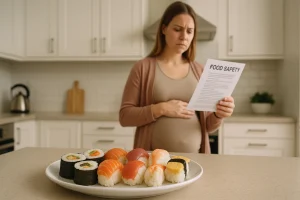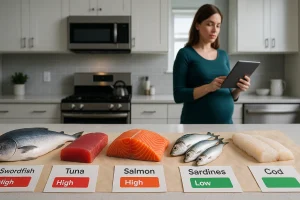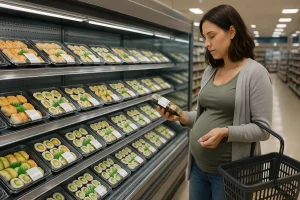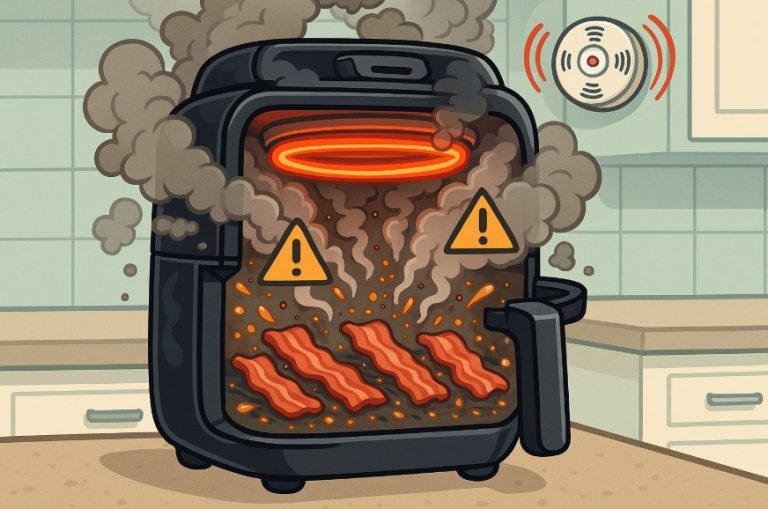Pregnancy is one of life’s most exciting and transformative journeys. During this time, a mother’s diet becomes more important than ever, as every meal contributes to her baby’s health and development. Yet, some foods that are otherwise safe suddenly make the “avoid” list and sushi is often one of them.
For many people, sushi is a treat, fresh, flavourful, and beautifully presented. But once pregnancy begins, questions arise: Why can’t pregnant women eat sushi? Is it because of the raw fish, or something more?
This blog explores the science behind the advice, the potential dangers of eating raw sushi during pregnancy, and which alternatives can allow expecting mothers to enjoy sushi safely without any risk to themselves or their baby.
What Makes Sushi Unsafe for Pregnant Women?

Sushi is not inherently dangerous, but the way it is prepared and the ingredients used determine whether it’s safe or risky. The main issue lies with sushi that contains raw or undercooked seafood.
Raw fish, even when handled carefully, can harbour harmful microorganisms such as Listeria monocytogenes, Salmonella, and Anisakis parasites. These bacteria and parasites are often killed through cooking, but since traditional sushi is not cooked, the risk remains high.
During pregnancy, a woman’s immune system changes to protect the growing baby, making her more vulnerable to infections. This means bacteria that would cause mild food poisoning in most adults can have far more serious consequences for pregnant women.
Pregnant women are about ten times more likely to contract listeriosis than other healthy adults. Even a mild infection can lead to miscarriage, stillbirth, or premature labour. In severe cases, the bacteria can cross the placenta and harm the baby’s developing brain and nervous system.
The risk is not limited to Listeria. Sushi may also contain parasites like Anisakis, which cause painful gastrointestinal infections, or Salmonella, which can lead to dehydration and complications in pregnancy.
Simply put, sushi is considered risky because it bypasses the protective step of cooking, leaving both the mother and baby vulnerable to foodborne pathogens.
What Are the Risks of Eating Raw Fish During Pregnancy?
The dangers of consuming raw or undercooked fish while pregnant go beyond an upset stomach. These risks can affect both the mother’s health and the development of the baby.
One of the most concerning infections is listeriosis, caused by Listeria bacteria. Though rare, this infection can be devastating during pregnancy. It may start with mild flu-like symptoms but can lead to miscarriage, stillbirth, or serious illness in the newborn.
Additionally, parasites such as Anisakis can live in raw fish and cause allergic reactions or stomach pain. These parasites can be destroyed through proper freezing, but not every sushi vendor adheres to strict freezing regulations.
Another major issue is mercury contamination. Some fish used in sushi particularly large predatory species, accumulate high levels of mercury in their flesh. When consumed, mercury can pass through the placenta and affect the baby’s developing nervous system.
Below is a summary of the most common risks associated with raw sushi:
| Risk Type | Example Source | Possible Effect on Pregnancy |
| Listeria bacteria | Raw salmon, shellfish | Miscarriage, stillbirth, premature birth, neonatal illness |
| Anisakis parasites | Raw cod, herring, squid | Stomach pain, vomiting, allergic reactions |
| Salmonella | Undercooked seafood | Food poisoning, dehydration, fever, complications |
| Mercury contamination | Tuna, swordfish, marlin | Brain and nerve damage to baby, developmental delay |
Because of these potential outcomes, health experts in the UK, including the NHS, strongly advise against consuming raw or undercooked fish during pregnancy, no matter how fresh or well-prepared it may appear.
How Does Mercury in Fish Affect Pregnant Women and Babies?

Mercury is a naturally occurring element found in oceans and rivers, but industrial pollution has increased its concentration in certain types of fish. When large fish such as shark, swordfish, king mackerel, and marlin eat smaller fish, they accumulate mercury in their tissues a process known as bioaccumulation.
For pregnant women, mercury poses a hidden but serious threat. It can cross the placenta and interfere with the baby’s developing brain, nervous system, and hearing. Even moderate levels of mercury exposure have been linked to delayed speech, impaired memory, and reduced coordination in children.
The NHS guidelines recommend:
- Avoiding shark, swordfish, and marlin entirely during pregnancy.
- Limiting tuna to no more than two fresh tuna steaks or four medium cans per week, due to moderate mercury levels.
While sushi-grade tuna may seem harmless in small portions, consistent consumption can still lead to mercury buildup over time. Thus, choosing sushi made from low-mercury fish or vegetarian alternatives is a much safer option.
Can Pregnant Women Eat Sushi If It’s Cooked?
Fortunately, not all sushi is off-limits. Sushi made with cooked fish or plant-based ingredients is considered safe for pregnant women, as long as it is prepared in a hygienic environment and stored properly.
Cooking seafood to an internal temperature of 63°C (145°F) ensures that harmful bacteria and parasites are destroyed. This makes dishes such as prawn tempura rolls, cooked salmon sushi, and crab maki safe alternatives.
Vegetable-based sushi is another excellent choice. Rolls made with ingredients like avocado, cucumber, sweet potato, or tofu are not only risk-free but also provide vitamins, minerals, and fibre beneficial for pregnancy.
Even supermarket sushi in the UK can be safe, provided it is labelled as such. Many large retailers, including Waitrose, M&S, and Tesco, use raw fish that has been frozen to kill parasites before being used.
However, while freezing helps, it doesn’t eliminate Listeria, so it’s still best to favour cooked or vegetarian sushi varieties during pregnancy.
What Sushi Should Pregnant Women Avoid Entirely?
To ensure safety, some sushi options should be completely avoided during pregnancy. These include any sushi made with raw or partially cooked seafood, as well as varieties containing high-mercury fish.
It’s also important to avoid sushi that has been improperly refrigerated or stored for long periods, as this allows bacteria to multiply even in cold environments. Cold-smoked fish such as smoked salmon is another food to skip unless it has been thoroughly cooked.
Below is a quick comparison:
| Type of Sushi | Safe During Pregnancy? | Reason |
| Raw salmon sashimi | ❌ No | May contain Listeria or parasites |
| Cooked prawn tempura roll | ✅ Yes | Fully cooked, safe when fresh |
| Tuna nigiri (raw) | ❌ No | High in mercury, risk of contamination |
| Avocado maki | ✅ Yes | Plant-based, no risk of infection |
| Smoked salmon roll | ❌ No | Cold-smoked, potential for Listeria |
| Crab stick (surimi) roll | ✅ Yes | Cooked and pasteurised ingredient |
Expecting mothers should also avoid any sushi that contains unpasteurised sauces or dressings, as these may introduce additional bacteria.
Can Supermarket Sushi Be Considered Safe During Pregnancy?

Many women wonder if the sushi sold in supermarkets across the UK is safe during pregnancy. The answer depends largely on how the sushi is made and stored.
Supermarket sushi that contains raw fish has typically been frozen first, which kills parasites such as Anisakis. This makes it safer than fresh sushi from restaurants or takeaway outlets that may not follow strict freezing protocols.
However, freezing does not kill all harmful bacteria, particularly Listeria, which can survive and grow in chilled conditions. Therefore, even when buying sushi from a trusted supermarket, pregnant women should always:
- Check that the packaging specifies the fish was previously frozen.
- Consume it before the use-by date.
- Ensure it has been refrigerated continuously.
When in doubt, choosing cooked or vegetarian sushi remains the most reliable way to enjoy this food during pregnancy.
What Alternatives Allow Pregnant Women to Enjoy Sushi Safely?
Pregnancy doesn’t mean giving up sushi altogether. There are many creative and delicious alternatives that mimic the flavours and textures of traditional sushi while keeping both mother and baby safe.
Sushi made with fully cooked seafood, such as prawn, crab, or salmon, provides protein and omega-3 fatty acids without the bacterial risk. Alternatively, vegetable sushi with avocado, cucumber, roasted peppers, or pickled radish can be both satisfying and nutritious.
Some pregnant women enjoy making sushi at home. Preparing it personally allows control over:
- Ingredient freshness
- Cooking methods
- Hygiene and temperature
Cooking methods like steaming, baking, and pan-frying effectively eliminate bacteria while preserving the rich umami taste sushi is known for.
Homemade sushi also allows creative variations, such as:
- Teriyaki chicken rolls
- Sweet potato tempura rolls
- Tofu and avocado maki
- Egg omelette (tamago) sushi
These alternatives make it possible to enjoy the artistry and satisfaction of sushi without worrying about raw ingredients.
What Do the NHS and Health Experts Say About Sushi During Pregnancy?

The NHS provides clear guidance on sushi consumption during pregnancy. According to official recommendations, sushi made with raw fish is only safe if the fish has been frozen beforehand to destroy parasites.
However, this precaution does not protect against Listeria, which is why many dietitians and midwives still advise avoiding raw sushi altogether.
UK health experts also recommend:
- Eating only cooked or vegetarian sushi.
- Avoiding fish high in mercury.
- Limiting oily fish consumption to no more than two portions per week.
- Ensuring all seafood is cooked thoroughly.
While sushi may be a cultural delicacy and an enjoyable meal, the potential health consequences of ignoring this guidance far outweigh the temporary craving. Prioritising food safety during pregnancy ensures a healthy environment for both mother and child.
Conclusion: How Can Expecting Mothers Make Safe Sushi Choices?
Understanding why pregnant women can’t eat sushi is not about creating fear, but about promoting awareness. Raw or undercooked seafood carries risks that are amplified during pregnancy due to a weakened immune system and the vulnerability of the developing baby.
By avoiding raw fish, limiting mercury exposure, and choosing cooked or plant-based alternatives, expectant mothers can enjoy sushi-inspired meals safely and deliciously. The safest approach is to follow NHS recommendations, practice good food hygiene, and prioritise peace of mind over momentary indulgence.
Pregnancy is a time to nourish, protect, and celebrate life and with the right choices, even sushi can fit into that journey.
FAQs
Why can’t pregnant women eat sushi made with raw fish?
Raw sushi can contain bacteria and parasites like Listeria that pose serious risks during pregnancy, including miscarriage and infection in newborns.
Can pregnant women eat sushi made with cooked ingredients?
Yes. Sushi made with cooked fish, such as prawn tempura or crab rolls, is perfectly safe when prepared and stored properly.
Is vegetarian sushi safe for pregnant women?
Vegetarian sushi is one of the safest options, offering nutrients without any risk of contamination.
Can supermarket sushi be eaten during pregnancy?
Most supermarket sushi in the UK is made with previously frozen fish, which reduces risk, but cooked or vegetarian sushi remains the safest option.
Which fish should be avoided due to mercury?
Avoid shark, swordfish, king mackerel, and marlin. Limit tuna due to moderate mercury levels.
Does freezing raw fish make it safe for pregnancy?
Freezing kills parasites but does not eliminate bacteria such as Listeria, so raw fish should still be avoided.
What are safe sushi alternatives for pregnant women?
Cooked or vegetarian sushi options such as avocado rolls, prawn tempura, or teriyaki chicken sushi are excellent choices.






